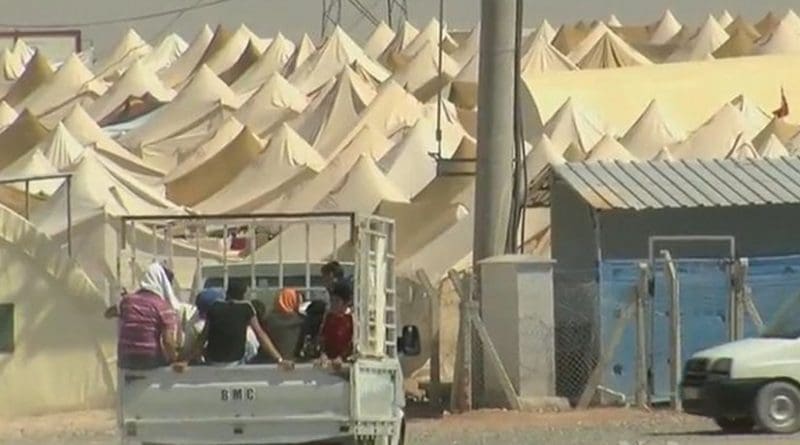The Syrian Refugees Crisis In US Election Debates: Compassion Versus Security – Analysis
By Observer Research Foundation
By Uma Purushothaman*
With the devastating attacks in Paris carried out by the ISIS and the endless stream of refugees from Syria, the Syrian crisis has unsurprisingly become a political hot potato in the US election campaign in the last couple of weeks.
The issue has divided the polity between those who want to continue the Syrian refugee programme and those who want to stop or modify it. Unsurprisingly, most Democrats want to continue the programme and the Republican by and large want to either modify or stop the programme.
The debate over Syrian refugees has seen Islamophobic statements from some Republican leaders. Further, the reactions from the Republican Party’s presidential candidates have been vitriolic with some of them asking for refugees to be turned away and others likening them to rabid dogs. While “moderate” Jeb Bush called for admitting only Christian Syrian refugees, Ben Carson wanted “moderate forces” in Iraq and Syria to establish “sanctuary zones”. Ted Cruz meanwhile wants the US to accept only those Syrians who are Christians. True to form, Donald Trump has described the idea of accepting Syrian refugees as “insane”.
Thirty One governors have even said (all of whom are Republican except one) that they will oppose settlement of Syrian refugees in their states. New Jersey governor and presidential hopeful Chris Christie has gone to extent of suggesting that he would not admit even a three year old orphan. However, what these governors have said cannot be done constitutionally because the right to admit someone into the country rests with the Federal government which has the right to resettle refugees anywhere across the country according to the 1980 Refugee Act. But the governors can make the acceptance process more difficult by putting refugees under greater scrutiny or by cutting funds for refugee resettlement.
Adding to this was the bill passed by the House of Representatives, where the Republicans have a majority, to put more hurdles in the path of refugee resettlement. The Republicans’ reaction is reflective of the public opinion. Fifty-three percent of respondents in a poll by Bloomberg News said the U.S. refugee programme should be halted, while just 28 percent said the programme should remain as it is. Another 11 percent wanted to continue the programme but wanted to screen out Muslims from entering the US. An NBC/Survey Monkey poll also showed that 56 percent of people disapprove of allowing more Syrian immigrants into the country.
These reactions are reminiscent of the US’ brutal record of turning away European Jews and incarcerating Japanese-Americans during World War II. A poll from 1938 on attitudes towards Jewish refugees shows that less than 5% of Americans believed that the US should increase its immigration quota and two-thirds of the respondents wanted to keep the refugees out. The results of this refusal to admit refugees were tragic, as history warns us.
Those opposing Syrian refugees forget that all the masterminds behind the Paris attacks held European passports. Second, the US has a strenuous vetting process in place for refugees. Moreover, the percentage of refugees who have committed terrorist acts is minimal and not one of them is Syrian. Of the 859,629 refugees admitted by the US since 9/11, as Alex Nowrasteh points out, only three have been convicted of planning a terrorist attack abroad and none have perpetrated a domestic attack. So,this fear of Syrian refugees is unfounded.
Thankfully, the Obama administration has said that it will accept 10,000 Syrian refugees next year and that it will increase the quota to 85,000 from the 2016 financial year. Secretary of State John Kerry has announced that he expects to increase the quota to at least 100,000 by 2017. Weighing in on the debate, President Obama said: “”When I hear a political leader suggesting that there should be a religious test for which a person who is fleeing from a war torn country is admitted… when some of those folks themselves come from families who benefited from protection when they were fleeing political persecution, that is shameful…We don’t have religious tests to our compassion.” The administration has also come out saying that Syrian refugees like other refugees are subject to intense scrutiny before their applications are granted.
The dispute over the Syrian refugees strikes at the very fabric of American democracy and its value system though it is reflective of the fear of terrorism emanating rom the Middle East. The US itself is a salad bowl enriched with a variety of immigrants from different nations. That is what makes that country so rich and unique and the land of opportunity. In fact, bringing in refugees might help the US economically in the long run.
A case study in Cleveland in fact shows that refugee resettlement programmes might help stimulate the economy through federal spending on refugees, direct and indirect benefits to local businesses and taxes.
The debate over Syrian refugees and how it pans out will show the direction the US is headed in the years ahead: will it be an inclusive society or will be a security driven, exclusivist state refusing to take in the “tired.. poor.. huddled masses yearning to breathe free”?
*Uma Purushothaman is a Research Fellow at ORF

